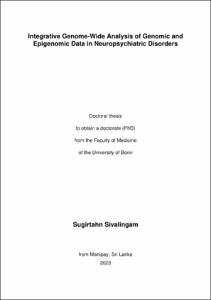Sivalingam, Sugirtahn: Integrative Genome-Wide Analysis of Genomic and Epigenomic Data in Neuropsychiatric Disorders. - Bonn, 2023. - Dissertation, Rheinische Friedrich-Wilhelms-Universität Bonn.
Online-Ausgabe in bonndoc: https://nbn-resolving.org/urn:nbn:de:hbz:5-69511
Online-Ausgabe in bonndoc: https://nbn-resolving.org/urn:nbn:de:hbz:5-69511
@phdthesis{handle:20.500.11811/10591,
urn: https://nbn-resolving.org/urn:nbn:de:hbz:5-69511,
author = {{Sugirtahn Sivalingam}},
title = {Integrative Genome-Wide Analysis of Genomic and Epigenomic Data in Neuropsychiatric Disorders},
school = {Rheinische Friedrich-Wilhelms-Universität Bonn},
year = 2023,
month = jan,
note = {The neurobiological correlates for the development of affective disorder development are largely unknown. There is increasing evidence that epigenetic modifications e.g. DNA methylation play an important role in the development of MDD (Major Depressive Disorder) and BD (Bipolar Disorder). We conducted two separate epigenome-wide methylation studies in whole-blood samples of female individuals with no reported history of psychiatric diseases to identify methylation sites associated with different risk factors for affective disorder: (i) familial risk (at least one 1st-degree relative with a history of affective disorder) or (ii) environmental risk (ranks above the threshold for a minimum of two forms of maltreatment in the CTQ (childhood trauma questionnaire)). Female individuals without any of these risk factors were chosen as controls. The data analysis pipeline included the following steps, probe filtering, functional normalization, and correction for leukocyte subpopulations. After rigorous quality control measurements, 495,406 DNA methylation sites were tested using a linear regression approach and correction for technical and biological covariates. Overall, 22,230 and 21,940 DNA methylation sites were nominally associated (p<0.05) with familial and environmental risk for affective disorder. Not any of the tested methylation sites reached epigenome-wide significance after correction for multiple testing. GO (Gene Ontology) analyses for familial and environmental risk displayed an enrichment of methylation sites in pathways related to neurogenesis and nervous system development. To identify the effects of genetic variants on the DNA methylation level, an integrated analysis of genome-wide genotype and epigenetic data was conducted. At this point, 45 independent single-nucleotide polymorphisms indicated a significant regulatory effect on DNA methylation. These methylation quantitative trait loci may help to understand the functional role of genetic variants in affective disorders. Further, analyses involving post-mortem brain samples, larger cohort sizes, and independent replication cohorts are needed to discover epigenetic mechanisms in affective disorder development.},
url = {https://hdl.handle.net/20.500.11811/10591}
}
urn: https://nbn-resolving.org/urn:nbn:de:hbz:5-69511,
author = {{Sugirtahn Sivalingam}},
title = {Integrative Genome-Wide Analysis of Genomic and Epigenomic Data in Neuropsychiatric Disorders},
school = {Rheinische Friedrich-Wilhelms-Universität Bonn},
year = 2023,
month = jan,
note = {The neurobiological correlates for the development of affective disorder development are largely unknown. There is increasing evidence that epigenetic modifications e.g. DNA methylation play an important role in the development of MDD (Major Depressive Disorder) and BD (Bipolar Disorder). We conducted two separate epigenome-wide methylation studies in whole-blood samples of female individuals with no reported history of psychiatric diseases to identify methylation sites associated with different risk factors for affective disorder: (i) familial risk (at least one 1st-degree relative with a history of affective disorder) or (ii) environmental risk (ranks above the threshold for a minimum of two forms of maltreatment in the CTQ (childhood trauma questionnaire)). Female individuals without any of these risk factors were chosen as controls. The data analysis pipeline included the following steps, probe filtering, functional normalization, and correction for leukocyte subpopulations. After rigorous quality control measurements, 495,406 DNA methylation sites were tested using a linear regression approach and correction for technical and biological covariates. Overall, 22,230 and 21,940 DNA methylation sites were nominally associated (p<0.05) with familial and environmental risk for affective disorder. Not any of the tested methylation sites reached epigenome-wide significance after correction for multiple testing. GO (Gene Ontology) analyses for familial and environmental risk displayed an enrichment of methylation sites in pathways related to neurogenesis and nervous system development. To identify the effects of genetic variants on the DNA methylation level, an integrated analysis of genome-wide genotype and epigenetic data was conducted. At this point, 45 independent single-nucleotide polymorphisms indicated a significant regulatory effect on DNA methylation. These methylation quantitative trait loci may help to understand the functional role of genetic variants in affective disorders. Further, analyses involving post-mortem brain samples, larger cohort sizes, and independent replication cohorts are needed to discover epigenetic mechanisms in affective disorder development.},
url = {https://hdl.handle.net/20.500.11811/10591}
}






